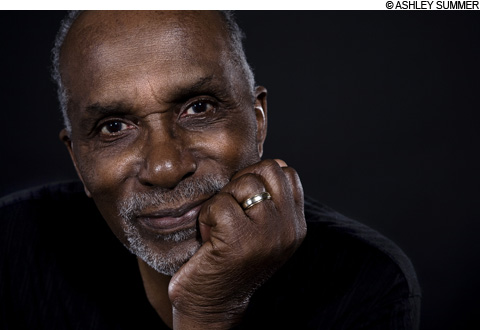
STRAIGHT TIME “You have to know what the song is about,” says singer Ed Reed, “and how can you be that person in the song.” |
It's almost cliché to describe the sound of a veteran jazz singer as "lived in." But Ed Reed has had quite a life. And for most of that life, the world at large did not know his sound — he released his first CD at the age of 78. That's partly because Reed had spent four decades as a heroin addict; and for more than a decade of that time he was incarcerated at San Quentin and Folsom prisons.So, yes, on his new Born To Be Blue (Blue Shorts) — as with his two previous albums — Reed (who comes to Scullers on January 18) sings with the voice of experience. Which doesn't mean "weathered." In fact, for a man who turns 83 next month, Reed — who's worked as an addiction counselor and health-care manager and educator since kicking drugs himself 25 years ago — sounds almost youthful. His baritone sits high, and the voice is flexible still, turning tricky phrases and swoops in register with seeming ease, underlining drama with a subtle vibrato.
But the experience — the "lived in" — quality of his singing comes from his interpretation of lyrics. He knows what he's singing about, and you hear every word. When he sings the standard "She's Funny That Way" — "I'm not much to look at/nothing to see/just glad I'm living/ and happy to be/I've got a woman crazy for me/she's funny that way" — you can hear that lifetime of experience in his easeful, natural phrasing.
That's one of the more familiar tunes on Born To Be Blue. For the most part, Reed has a way of finding the less-covered material by familiar composers — Blossom Dearie's "Inside a Silent Tear," Abbey Lincoln's "Throw It Away," "Monk's Dream" (with Jon Hendricks's lyrics), Mel Tormé's title tune. And whatever the song, he has his own way of doing it — like Nat Adderley's "Old Country."
"I always thought it was a sad song," Reed tells me over the phone from his San Francisco Bay Area home, "and everyone always galloped with it!"
Reed is an interpreter, not a writer, and his singing is akin to a great actor performing a role he relishes. When he leads workshops with other singers, he emphasizes the importance of getting inside the song. "You have to know what the song is about, and how can you be that person in the song, where that person is, the ambiance of the room." Sometimes the role he's playing is more directly autobiographical, as in "Inside a Silent Tear": "That's the story of my addiction — I couldn't talk!"
The lived-in time of Reed's song space is usually set to a ballad tempo — rarely more than medium-fast. But it never gets tired. Contrasting tempos come in the solos from his terrific band of Bay Area regulars, including — on the current album — pianist Randy Porter, drummer Akira Tana, and the tenor saxophonist Anton Schwartz. On the Bernstein-Comden-Green "Some Other Time," Schwartz follows Reed's verse with a solo that has a Coltrane-like glow, making the comparisons with the Trane-Johnny Hartman tenor-singer paring inevitable. But the space and weight Reed gives his lyrics — and his higher range — remind me more of Lincoln, and not just when he's doing her song.